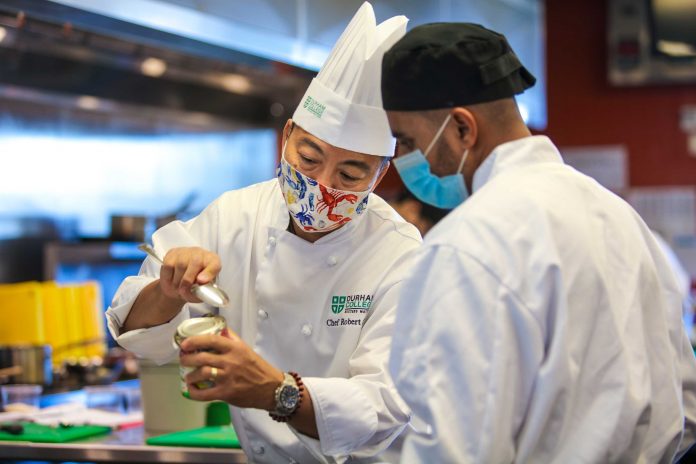Editor’s note: Chronicle reporters are examining how select programs at Durham College and Ontario Tech University have responded to the teaching and learning process during COVID-19. Most programs have moved online, but some classes are being conducted on campus.
The pandemic prompted many people to pick up cooking as a hobby. But what about those for whom culinary skills are a professional requirement and not just a passing fancy?
Peter Lee, the Culinary Skills program coordinator at Durham College (DC), got his answer sooner than most.
“We started our in-person classes in the spring/summer semester,” says Lee. “We were one of the four colleges allowed to have in-person training. So, we were kind of a pilot project for Ontario.”
Last summer, Ross Romano, Ontario’s minister of colleges and universities, told reporters the pilot project was aimed at helping “academically stranded students” who require hands-on experience in order to graduate.
Students in the culinary skills program were one of the first to return to campus, albeit in smaller batches.
Lee says it was easy to adapt, because “we have a naturally clean environment,” thanks to the hygiene standards already in place in labs.
However, the pandemic did prompt the faculty comprising of Lee, Tanya Heck and David Hawey to try new methods of teaching at DC’s Whitby campus.
In order to reduce the time students spent in labs, they made instructional videos to explain different aspects of the course.
“The pandemic was kind of a good thing,” explains Lee, “because we’d never made these videos before. Now they’re a pretty good learning tool.”
Though they could have up to 24 students in a lab at one time, Lee says they capped the number at 18 “just to be a little safer and ensure social distancing.”
The culinary skills program is a one-year course, with students having the option of returning the following year for culinary management. Lee says he normally has around 90 students in the first year, but enrolment has dropped for the new academic year that began last fall, largely due to fewer international students.
“About 40 per cent of our program is made up of international students,” says Lee, adding most are from India.
However, the drop in enrolment is mitigated by the fact that shifting to a hybrid form of learning hasn’t increased costs for the program.
“Our biggest expense is in the labs, and if they’re coming to lab and actually cooking food, the cost is the same,” explains Lee. “There is no real cost for theory classes, because [students] are still taking them online.”
In addition to instructional videos, another change is that tests for theory classes have shifted online. Rather than complete them over the weekend as was the norm before the pandemic, students now work on them during online class time.
Glesy Panaga, a student in the program, says while online learning offers her flexibility in terms of work, she worries “the learning outcomes may not be the same.
“I can watch the chef instructor doing the process virtually,” she says, referring to the videos that have been made available. However, while earlier she would have been following such instructions solely in the lab, Panaga says she has to practise at home now. “I may probably not retain all the steps because I have no experience doing it myself.”
The new learning environment isn’t ideal, Lee admits.
“If I was a student, I’d probably not like learning online,” he concedes.
The faculty aims to improve student engagement by increasing discussion posts and putting out more content on social media.
Even though the Durham College campus continues to report cases of COVID-19, Lee says his students have moved past their initial wariness of coming to lab.
“I find the students actually like coming to class,” says Lee with a chuckle, “because they get a reason to leave their house!”




